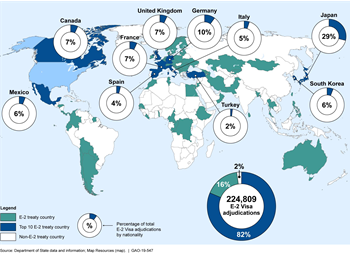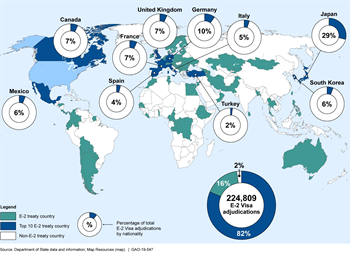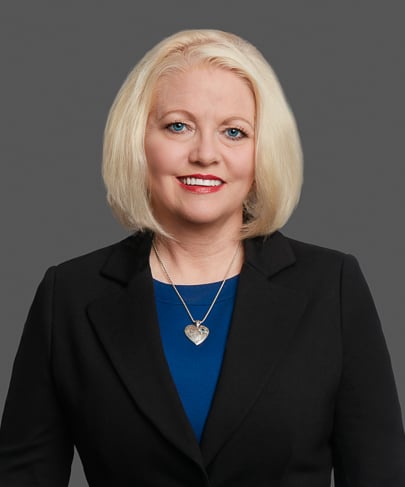2020年中に予想される改正 - 相互主義に基づくビザの申請料及びE-2ビザに関するルール変更 | Visa Reciprocity Fees and E-2 Visa Adjudications – Targets for Change In 2020
Click “Subscribe Now” to get attorney insights on the latest developments in a range of services and industries.
ビザ取得に関しては、およそ事前の通知もなく、突然ルール改正がなされることが常々です。例えば、オーストラリア国民についての非移民ビザの申請料は、2019年12月23日付で大幅に値上げされました。すなわち、E-1ビザとE-2ビザ(条約貿易者/投資家ビザ)の申請費用は105ドルから3,574ドルへ(3303.81%の値上げ)、L-1ビザとL-2ビザ(社内転勤者ビザ)の申請費用は150ドルから1,790ドルへ(1604.76%の値上げ)と値上げされました。また、例えば、フランス国民についてのE-1ビザとE-2ビザの有効期間は、2019年11月12日付で60ヶ月(5年間)から25ヶ月に短縮されました。このようなルール変更が与える影響を、国務省に保存されている記録を確認して把握することは困難です。なぜかというと、ルール改正前のデータを、ルール改正後と比較したデータを作成することが行われていないからです。また、ルール改正は突然で、事前の通知もありませんから、ビザ取得のルールはますます予測不可能なものになっています。
どうしてビザ取得のルール変更が行われるのでしょう
これらのルール改正は、2017年3月に大統領が署名した大統領令第13780号の第10条の委任命令に基づくものです。この委任命令は、全ての非移民ビザに関わる相互主義の合意や取決めを国務省(DOS)が見直し、それらが本当に相互主義に基づくものになっているのかを確認するように求めるものでした。修正移民国籍法(INA)の第281条は、ビザ申請料金とは、「外国政府が米国国民のビザ取得、入国、居住などに対して課す費用、税金など」の合計額に相当する額にすべきとしています。この「相互主義」は、米国におけるビザ取得の費用と、外国政府が米国国民に課す費用との間のギャップをなくすために見直しされます。オーストラリア政府が米国国民が4年間有効な就労ビザ(L-1ビザ相当)を取得するために課す費用は、10,000ドルを超える可能性があり、これが上述の値上げの根拠とされています。しかし、この変更は事前の通告もなしに突然実施され、変更前に予約したビザ面接にも適用されました。
ここで学ぶべきこと – 面接当日になって、いきなり申請料金やビザ有効期限に変更があるかもしれません。ビザ取得のルールを確認しましょう。
E-1ビザとE-2ビザ~2020年に予測されるルール変更
米国政府監査院(GAO)は、2019年7月付で「非移民投資家ビザ:E-2ビザの付与と不正行為の防止に必要な対応策について」と題する報告書を公表し、数項目の推奨事項を示しました。これらの推奨事項は、各国の米国領事館での申請レベルで徐々に浸透しはじめ、2020年にはさらに実施が進むと考えられます。この報告書には、Eビザに関して次の図が示されています。
図5:国別のE-2ビザ付与状況、2014年度~2018年度

注:2019年6月時点で、計82ヶ国の国民に対してE-2が付与されました。2019年5月1日付でイスラエル国民に対して、新たにE-2ビザの申請またはE-2ステータスへの変更資格が与えられました。
さらに、この報告書には以下のグラフが掲載されています。これは2018年度のE-2ビザに関する投資動向を示す興味深いデータです。
図13:2018年度にE-2を認められたビザ取得者が報告した関連投資額

注:このグラフは、ビザ取得者(投資家、管理職、不可欠なスキルを有した従業員)が、米国企業に投資した金額を報告したもの(自己報告ベース)に基づくものです。「関連」投資額とされているのは、ビザ取得者自身が投資をするのではなく、E-2登録をする会社により投資が行われた場合が含まれるからです。E-2ビザ取得者の被扶養者が報告したデータは収集されておりませんので、かかるデータはありません。
報告書が示す推奨事項
E-2ビザの会社登録
報告書の推奨事項の1つ目は、国務省(DOS)が、E-2登録された会社の登録資格の再審査の手順や、E-2会社登録のための最低基準を策定すべきというものです。
これに対して、国務省(DOS)は、「Eビザ登録会社の登録資格を、5年ごとに再審査する予定である」、と報告しました。E-2会社登録プログラムを利用する場合、各国の米国大使館/領事館は、その会社がE-2登録資格があるかを、最初のEビザ申請時に審査します。いったんEビザの会社登録がなされれば、その後従業員のE-2ビザを申請する都度、会社のE-2資格を再審査する必要ありませんでした。E-2会社登録プログラムは、2019年4月時点、7カ所(ロンドン、マドリッド、ローマ、東京、大阪、フランクフルト、トロント)で利用可能となっています。
- Eビザ会社登録が必要な場所、必要でない場所 - これら7つの米国大使館/領事館のうち3ヶ所では、全てのE-2ビザ申請会社は、Eビザ会社登録をしなければならないと義務付けています。その他の米国大使館/領事館では、規模の大きい会社(たとえば米国で500人の従業員を持つ会社など)のみに登録を必須としています。登録を必須とする場合、通常約2,200~4,000社が登録されています。
- 必要書類 – いったんEビザ登録された会社が、その後の各ビザ取得者のE-2ビザ申請に際して提出しなければならない書類は、申請場所によりかなり異なります。ある米国大使館/領事館では、単にビザ取得者の履歴書と会社からのサポートレター(駐在先の米国会社での役割が記されます)のみを提出すれば足りるとされています。
- 再審査 - 7つの米国大使館/領事館のうち2カ所では、Eビザ登録会社の資格を毎年再審査しています。その他のの5ヶ所では、5年毎のフォローアップの見直しのみとなっています。なお、大使館/領事館は、会社投資家や従業員のビザ資格に影響を与えるような変更があった場合には、会社は、最新の情報を提供しなければならない、としています。
米国政府監査院(GAO)からのコメント – この状況について、GAOは、米国大使館/領事館は、Eビザ会社登録のための最低基準を示していない、と指摘しています。
予測される変更 - 会社は、そのE-2登録プログラムの有効性を維持するためにこれまでより頻繁に情報の更新を行い、会社登録・ビザ申請により詳しい書類が要求されるようになることに対して備えをしておくべきです。さらに、会社はE-2会社登録を維持するため、変更事項があったときは適切に記録し、タイムリーにビザ申請を受け付けた大使館/領事館に報告を行う必要があります。
E-2ビザに関する不正行為
まず、この報告書は、E-2ビザを利用した不正行為に対する認識が、国務省(DOS)と米国市民権・移民業務局(USCIS)で異なると指摘しています。
すなわち、2015~2018年度の国務省(DOS)データでは、不正行為は2015年の664件が2018年には280件に減少しています。一方USCISの局員は、E-2ビザに関わる不正行為は重大な問題だとしています。
大使館/領事館の中には、国務省(DOS)のために、次のアクションを実施して不正の問題に対処しているところがあります。
- 追加の審査 – ある大使館/領事館では、全てのE-2ビザ申請は不正防止管理者へと送られます。その後、不正を示すものがないかさらに調べるために、地域警備幹部調査員補佐(ARSO-1)の審査を経ることになります。
- 検証調査 – 2016年に大使館/領事館レベルで行われた調査によると、(1)外食事業関連のE-2会社の25%は、約3年以内に事業が失敗し、(2)会社をたたんだE-2ビザ保持者の約半数が、会社が存在しなくなっても米国に滞在を続け、またはそのE-2ビザを使って米国へ入国したとの結果が示されました。調査を行った不正問題担当チームは、承認済みのE-2会社登録の登録資格を再審査するために、標準化されたフォローアップ手順を策定することを推奨していました。
- ワルシャワにある米国大使館からの国務省(DOS)監察本部(OIG)2019年9月「月次アップデート」では、次のような報告がされています。「国務省(DOS)のケンタッキー領事センター(KCC)は、領事課に提出される前にEビザの複雑な提出書類要件を確認するために、事前裁定サポートサービス(PASS)のKCCで訓練を受けた専門家を使って、E-1・E-2ビザ裁定の合理化と改善プログラムを試験的に実施している。」このパイロットプログラムは、ケンタッキー領事センター(KCC)のディレクターが実施した11の新しい不正行為防止イニシアチブの1つで、これはこのディレクターが在任中に「領事館業務の検査、ケンタッキー領事館センター」と題する2019年8月のOIGレポート番号ISP-1-19-36にその概要を記しているものです。
これに対して、米国市民権・移民業務局(USCIS)は、E-2の最初のビザ申請またステータス変更およびE-2ステータスの延長請願に、以下の不正行為防止策を講じています。
- 不正の調査と現場視察 - 入国審査官(ISO)は、異常やその他の不正行為を示す事象を見つけた場合は、不正の照会をサービスセンターの不正検知事務局に送ります。不正検知事務局はそれを受けて会社のウェブサイトを調べたり会社に対して現場視察を要請するなど、さらに調査を進めます。
- 評価用ツール - 米国市民権・移民業務局(USCIS)は不正評価ツールを使って、会社が存在しているのか、また財務的に存在可能な状態であるのかを判断します。USCISは通常「事業体の検証用ツール(VIBE)」を使います。VIBEによる審査には、事務用品店での購入状況または公共料金請求書など事業に関連した情報の調査が含まれます。ケンタッキー領事センター(KCC)は国務省の事業記録を使って事業の存在状態を検証します。
- 現場視察 - 入国審査官(ISO)は、検証を行うために会社現場での視察を要請することができます。2014~2018年度の間に、ISOは「事業体の検証用ツール(VIBE)」の結果に基づき、E-2会社の現場視察を252件要請しました。これらの現場視察の25%(63件)で不正行為が確認されました。63件のうち、42の会社はビザ申請に記載された場所に存在せず、14の会社は不正な書類を提出していたり事実を偽って表明をしていました。国務省(DOS)もまた、米国市民権・移民業務局(USCIS)に現場視察をするよう要請を出すことがありますが、2014~2018年度の間に国務省(DOS)の職員が出した現場視察の要請は10件だけです。
予測される変更 - 国務省(DOS)と米国市民権・移民業務局(USCIS)の不正検出および国家安全保障局(FDNS)間での協力やデータ共有が進んでいます。会社は、定期的に内部監査を実施して、E-2ビザ申請または登録に情報の更新や修正が必要かどうかを判断すべきです。
さらに、会社はそのE-2登録および従業員のためのビザ申請に関して現場視察が行われる可能性があることを予測し、そのような事態に備えておくべきです。
この「クライアント・アラート」は、ディキンソン・ライト法律事務所が発行しているもので、移民法に関する重要な事柄・出来事をクライアントや知り合いの方々に提供することを目的としています。これは情報提供のみを意図しているもので、法的または専門的なアドバイスではありません。ここで取り上げたトピックスに関して特定の質問または懸念事項をお持ちの場合は、ディキンソン・ライトの弁護士にご相談ください。
Change is a constant in immigration visa adjudications and drastic changes can be implemented from one day to the next without much, if any, notice. For example, the reciprocity fees for the nonimmigrant visas for Australian citizens changed drastically on December 23, 2019.[1] For example, for E-1 and E-2 treaty trader/investor visas, the application fee increased from $105.00 to $3,574.00 (a 3303.81% increase), while L-1 and L-2 intracompany transferee application fees changed from $150.00 to $1,790.00 (a 1604.76% increase). In addition, effective November 12, 2019, the maximum validity of E-1 and E-2 nonimmigrant visas for French citizens was reduced from 60 to 25 months. It is difficult to track the impact of these changes using the Department of State’s visa reciprocity archives, since the information from the prior reciprocity schedule in comparison to the new announced change(s) are not preserved. The lack of prior notice of these changes results in increasing unpredictability regarding the visa process.
What is going on with the Reciprocity Schedule Changes?
These changes are a result in part of the mandate contained in Section 10 of Executive Order 13780 issued back in March of 2017, which requires the Department of State (DOS) to review all nonimmigrant visa reciprocity agreements and arrangements to ensure that they are truly reciprocal. Section 281 of the Immigration and Nationality Act, as amended (INA), requires that visa fees shall be in amounts that correspond to the total of all “…visa, entry, residence, or other similar fees, taxes, and charges assessed or levied against nationals of the United States by the foreign countries of which such nonimmigrants are nationals….” These “reciprocity fees” are reviewed to eliminate the gap between comparable U.S. visa fees and the fees charged by a foreign country to U.S. citizens. Australian fees and charges for their equivalent to the L-1 category for a four year temporary work assignment can exceed USD$10,000.00, so there is a basis for the increase noted above, but the changes were implemented without prior public notice and were applied to visa appointment applications scheduled before the effective date of the change.
Lesson to be learned – Check the reciprocity schedule even on the date of the interview for potential surprises in fees as well as visa validity.
Predictions of Changes in 2020 Regarding E-1 and E-2 Visa Processes
The recommendations contained in a July 2019 report from the U.S. Government Accountability Office (GAO) entitled, “Nonimmigrant Investors: Actions Needed to Improve E-2 Visa Adjudication and Fraud Coordination,” are already being felt at the consular application level with more to be expected in 2020. The report included the following chart regarding E visa use:
Figure 5: E-2 Visa Adjudications by Country of Nationality, Fiscal Years 2014 through 2018


Note: As of June 2019, nationals of 82 countries may be accorded E-2 status. Beginning May 1, 2019, Israeli nationals became eligible to apply for E-2 visas or petition to change to E-2 status. Similarly, New Zealand nationals became eligible to apply for E-2 visas or petition to change to E-2
In addition, the report included the chart below, which reflects some interesting data as to investment trends in fiscal year 2018 for E-2 visas.
Figure 13: Associated Investments Reported by Principal Beneficiaries in Our Generalizable Sample Who Were Approved for E-2 Status in Fiscal Year 2018


Note: This figure is based on self-reported information from principal beneficiaries (e.g., investors, managers, and essential employees) on the qualifying total investment in a U.S. enterprise. The investment may be associated with the beneficiary because the beneficiary may not have made the investment themselves, but the investment was instead made by a separate E-2 investor. The figure does not include investment information reported by dependent E-2 beneficiaries because the Department of Homeland Security does not collect such information, as it is not needed to determine E-2 dependent eligibility. The estimates in this figure are based on the results of our generalizable sample of approved fiscal year 2018 petitions and have a margin of error of +/- 12 percentage points or fewer. Percentages may not sum to 100 due to rounding.
Report Recommendation Topics
Company Registration
For example, one of the recommendations made in the report was for the DOS to develop minimum standards for E-2 company registration programs, including how E-2 registered companies will be re-vetted for qualifications.
In response, DOS reported that it plans to implement a policy of a 5-year mandatory review of companies registered at any post using a company registration program. An E-2 company registration program allows posts to assess companies for E-2 eligibility and after this assessment, the company’s E-2 eligibility is not reviewed each time it seeks an E-2 visa for an employee. As of April of 2019, 7 of the top 10 volume E-2 adjudicating posts had implemented an E-2 company registration program (i.e., London, Madrid, Rome, Tokyo, Osaka, Frankfurt, and Toronto).
- Restricted and Non-Restricted Options – 3 of these posts require all E-2 companies to register, while some posts tie the limited option to volume (e.g., companies with 500 employees in the U.S.). Posts with a requirement for registration typically had from approximately 2,200 to 4,000 companies registered.
- Documentation Required – The documentation required of E-2 visa applicants from registered companies varied widely. At 2 posts, visa applicants were only required to provide a resume and a company support letter regarding their proposed role with the company.
- Revetting Policy – 2 of the 7 posts reviewed company qualification annually while the other 5 only required a follow-up review every 5 years. Consular managers indicated that companies were required to update the post of any changes impacting visa eligibility of the company investors and employees.
Comments by the GAO – The GAO noted that the Bureau of Consular Affairs had not provided minimum standards for E-2 company registration programs.
Changes to Expect – Based on these observations, companies should prepare for more frequent updates to maintain the validity of their E-2 registration programs as well as more detailed documentary requirements for visa and registration applications. Further, companies must track changes to report timely to the consular post(s) maintaining their E-2 registration(s).
E-2 Visa Fraud
The report noted a different perception between DOS and U.S. Citizenship and Immigration Services (USCIS) as to the presence of fraud in E-2 visa applications.
While DOS data from fiscal years 2015 to 2018 noted a decrease in fraud referrals from 664 in 2015 to 280 in 2018, USCIS officials indicated that they consider E-2 visa fraud to be a significant issue.
For DOS, some of the posts had implemented the following actions to address fraud concerns:
- Additional vetting – At one post, all E-2 visa applications are sent to the fraud prevention manager and then to the Assistant Regional Security Officer Investigator (ARSO-1) to conduct additional research for fraud indicators.
- Validation study – One post had conducted a validation study in 2016 as to the extent to which foreign nationals who were issued visas later overstayed or misused their visas. This 2016 study concluded that 25% of the food service E-2 companies had failed within about 3 years and nearly 50% of the E-2 visa holders either failed to depart the U.S. after the company’s demise OR continued to travel to the U.S. using their E-2 visas. This post’s fraud team recommended standardized follow-up procedures for approved E-2 companies to verify ongoing eligibility.
- The September 2019 Monthly Update from the DOS Office of Inspector General (OIG) from the U.S. Embassy in Warsaw noted that the DOS Kentucky Consular Center (KCC) was piloting a program to streamline and improve E-1 and E-2 visa adjudications by using KCC trained experts in its Pre-Adjudication Support Service (PASS) unit to verify the complex documentary requirements for E visas before the submission of cases to consular sections. This pilot program was one of 11 new fraud prevention initiatives implemented by the Director of the KCC during his tenure outlined in the OIG Report number ISP-1-19-36 from August 2019 entitled, “Inspection of Consular Affairs, Kentucky Consular Center.”
USCIS, in contrast, for E-2 initial petitions as well as changes of status and extension petitions for E-2 status uses the following anti-fraud measures:
- Fraud research and site visits – Immigration Service Officers (ISOs) look for anomalies and other indicators of fraud and for any findings send a fraud referral to the service center’s fraud detection office. The fraud detection office then conducts further research such as reviewing company websites and may request a site visit to the company.
- Assessment technology – USCIS uses fraud assessment technology to determine if the company exists and is financially viable. USCIS will typically use the Validation Instrument for Business Enterprise (VIBE). A VIBE review can include such business related information as an office supply store account or utility bills. The KCC does verify business existence using its access to state secretary of state business records.
- Site Visits – ISOs may request site visits to a business site for verification. From fiscal year 2014 to 2018, ISOs made 252 requests based on VIBE results for site visits related to E-2 petitions. For 25% of these site visits (63 requests), USCIS confirmed fraud. Of the 63 confirmed fraud findings, 42 companies were not located at the site stated in the petition and 14 companies had provided fraudulent documents or otherwise misrepresented the facts. DOS consular officers may also request that USCIS conduct site visits. According to USCIS, DOS officers only requested 10 external site visits from fiscal years 2014 to 2018.
Changes to Expect – Based on increased cooperation and data sharing between the DOS and the Fraud Detection and National Security Division (FDNS) of USCIS, companies should conduct regular internal audits to determine if E-2 visa applications or registrations require updates or amendments. In addition, companies should expect and prepare for on site verification visits as to their E-2 registrations and visa applications for employees.
Related Practices
Contacts
Recent Insights
- December 4, 2025 In the News Two Dickinson Wright Attorneys Recognized in Lexology Index Thought Leaders Global Elite 2026
- December 01, 2025 Articles Rising Scrutiny in Employment-Based Visas: What Employers Must Prepare For
- November 21, 2025 Conferences Dickinson Wright to Present at the Michigan–Japan HR Conference
- October 10, 2025 Recognition Congratulations to Kathleen Campbell Walker for being selected to the 2026 Lawdragon 500 Leading Corporate Employment Lawyers guide.
- September 22, 2025 Articles Presidential Proclamation on H-1B Restrictions and Fees – What We Know as of Sept. 22
- September 18, 2025 In the News Five Dickinson Wright Attorneys Recognized in 2025 Texas Super Lawyers, Three Named Rising Stars
- August 29, 2025 Media Mentions Susan Ramos was recently quoted in a CNN Politics article, “Trump administration expands ‘good moral character’ requirement to become naturalized citizen.”
- July 22, 2025 Blogs Key Government Takeaways from the 2025 AILA Conference
- July 2, 2025 In the News Susan Ramos Joins Dickinson Wright Phoenix Office


